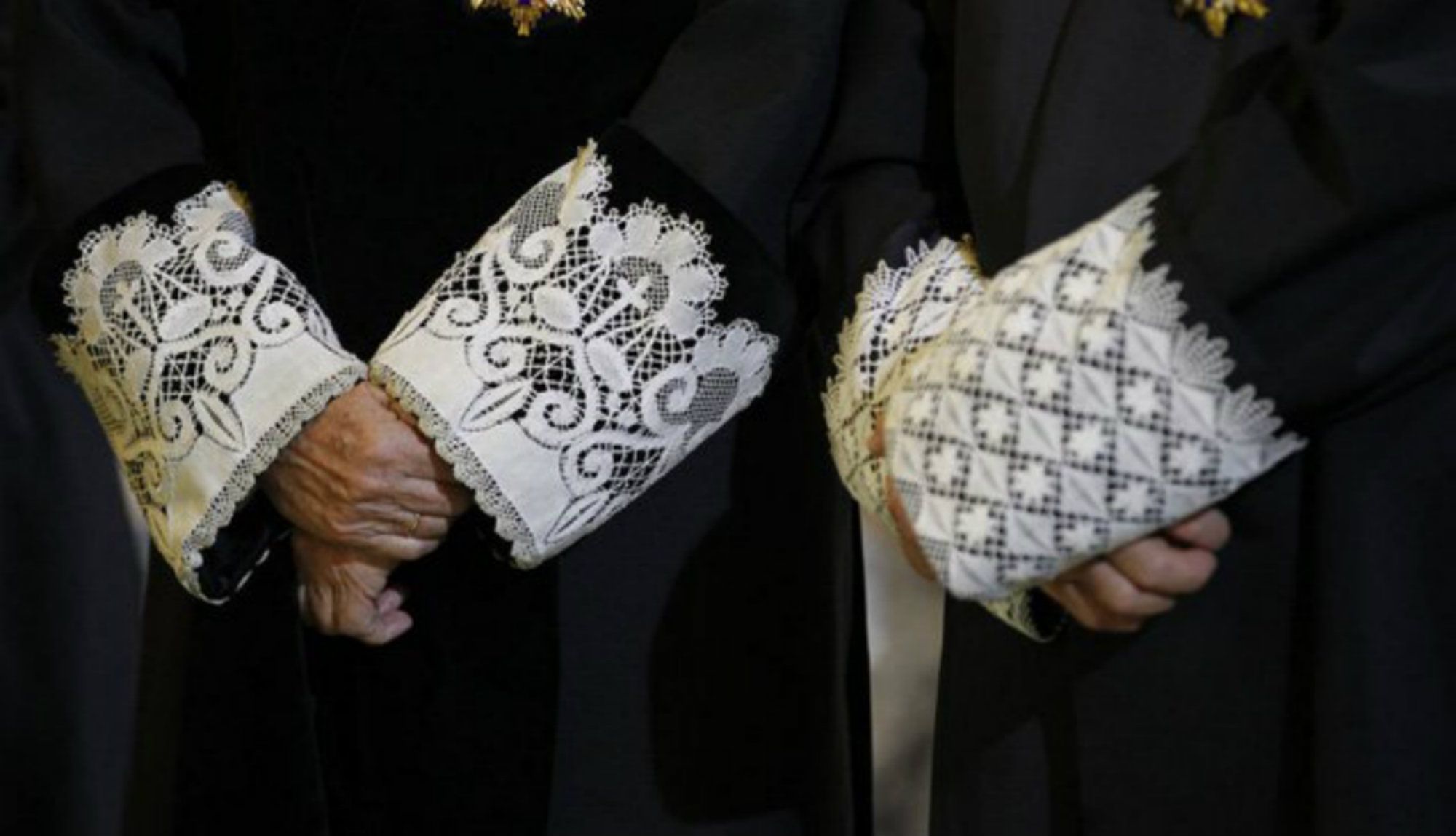The Catalan independence movement is looking optimistically at the legal options the Catalan case could have internationally. After having a number of paths shut of by the Spanish legal system, international courts are its last hope to put the story outlined by judge Pablo Llarena against the ropes, a story of violence and of crimes like rebellion, a story now under examination by judges around the continent. This is a long, risky process, but one which has already borne its first fruits.
Currently, two verdicts have given the first chink of light. First, ten days ago, the UN Human Rights Committee accepted to consider an appeal from Jordi Sànchez and ordered instant interim measures against Spain to guarantee his political rights. Second, last Monday, the same committee accepted another lawsuit, this one from president Carles Puigdemont.
There is no final verdict, and there won't be for another six months. For the moment, the applications have only been registered and, in the case of Sànchez, interim measures have been dictated, but it's the first step opening a new window of opportunity for the cause as a whole. In fact, Jordi Sànchez's defence sees it as a "success" and has already forwarded the verdict to both Spain's Supreme Court and Constitutional Court, after judge Pablo Llarena restricted his political rights, preventing him from standing as a candidate for investiture as Catalan president.
Not complying with the UN's interim measures could be presented as evidence to not carry out the extraditions
Moreover, these verdicts leave open the possibility of a presidential investiture, currently blocked by the vetos from Spanish justice against the three candidates proposed. In the Parliament's corridors, talk is of now of making the most of the UN's verdict and even trying to stretch it to Carles Puigdemont as they believe he fits the "same criteria". In the president's case, however, no interim measures were asked for, because he wasn't yet in custody. Puigdemont remains plan A for JxCat and CUP; ERC, on the other hand, is showing much more mistrust of picking up his candidacy again.
But, investiture aside, defence counsel also believe that the possibility opened up by the UN can help the exiles facing extradition proceedings. According to the Parliament's deputy speaker, Josep Costa, if Spain doesn't concede the interim measures to Jordi Sànchez, "there will be consequences" in the proceedings underway against Puigdemont, the ministers and Marta Rovira.
In other words, the UN's order could be presented as evidence that the Spanish state doesn't guarantee human rights. It could be argued as a reason to not grant the extraditions. This ideas was suggested by international lawyer Nico Krisch, who presented the application to the UN and believes that not complying with the Committee's rulings would be a violation of international law affecting Spain's reputation. "States which violate human rights put themselves in a vulnerable situation," warned Krisch last week.
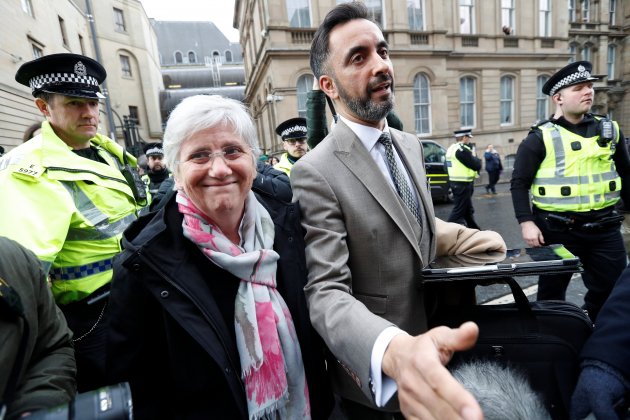
ACN
Four countries examine Llarena's story
Judge Pablo Llarena has made all efforts possible to justify trying the politicians and civil leaders for the crime of rebellion, whose definition, according to many prestigious lawyers, isn't met in the Catalan case due to the absence of violence. "If we had to explain to law students what rebellion is, Tejero's sentence is very instructive", said judge Montserrat Comas in an interview with El Nacional, referring to the former Civil Guard lieutenant colonel who led the armed officers who held the Spanish congress hostage overnight as part of an attempted coup d'état starting on 23rd February 1981. With this setback, Llarena, the investigating judge, has had to construct a story of violence. For example, when he talks about the demonstrations on 20th September, which he literally compares in the indictment with "taking hostages by shooting into the air" (which is, as it happens, one of the most famous images of the 1981 coup). Similarly, according to Llarena, the main pro-independence leaders "always had to imagine that the independence process would end with resorting to the instrumental use of force".
However, to proceed with the requested extraditions, this narrative of a supposed "violent uprising" will have to be examined by the legal systems of four countries: Germany, Belgium, Switzerland and Scotland. European and international arrest warrants are far from being automatic: Llarena's request and, above all, his arguments for it are being pored over with a magnifying glass. The narrative of events created by the judge has to pass four tests. It won't be so easy to extradite the exiles for rebellion. In November, Llarena already had to withdraw a previous attempt.
In Germany, where president Carles Puigdemont is in custody awaiting a verdict, the judge who questioned him has warned his extradition might be found "inadmissible" once the investigation is completed, "taking into account all the legal questions involved". It has also been questioned by German legal scholars quoted in the news magazine Der Spiegel, including a former president of a chamber of the Federal Court: "It's obvious that that doesn't constitute any German statutory offence" and "it's not obvious that Mr Puigdemont had the intention of using violence to destabilise Spain". Puigdemont's defence is being led by the prestigious lawyer Wolfgang Schomburg, one of the world's great specialists in international criminal law, a tough nut to crack.
This narrative of a supposed "violent uprising" will have to be examined by the legal systems of four countries: Germany, Belgium, Switzerland and Scotland
In Belgium, the memory of the European Arrest Warrants that Llarena had to withdraw, facing the possibility they would be denied, is still alive. This time, Brussels has left Toni Comín, Meritxell Serret and Lluís Puig free. It hasn't summonsed them nor will it control their movements, for the moment. Public prosecutors have requested additional information from Spanish authorities and will then examine the requests again.
In Scotland, minister Clara Ponsatí also finds herself free, and as having received strong social and political support. The judge has only dictated the interim measure of withdrawing her passport, after she put herself at the disposition of the authorities. Ponsatí has contracted the services of lawyer Aamer Anwar, a specialist in human rights, named lawyer of the year at the Scottish LegalAwards in 2017. Her first hearings will be held on 12th and 18th April.
In the case of Switzerland, where former CUP deputy Anna Gabriel and, reportedly, ERC's secretary general Marta Rovira are, there has still been no official response from the country's authorities. In terms of Gabriel, because the arrest warrant was limited to Spanish territory. For Rovira, the spokesperson for the Federal Department of Justice said that "as in the case of Anna Gabriel, the principle is also applied to all the other Catalan politicians who come to Switzerland that this country, like the majority of other states, doesn't grant extradition for political crimes".
Llarena is taking a lot of risks, like not all (or none) of the countries extraditing those he wants, or that they don't do so for all charges, only for misuse of public funds and not for rebellion. In that case, they could only be tried over that lesser charge.
There's a recent precedent to take into account. On 13th March, an Irish judge denied a European Arrest Warrant issued by Poland against Artur Celmer, accused of crimes linked to drug-trafficking. She did so over political interference in the Polish legal system, which gave rise to doubts over whether he would have a fair, impartial trial. The judge send the case to the European Court of Justice, which will now have to decide.
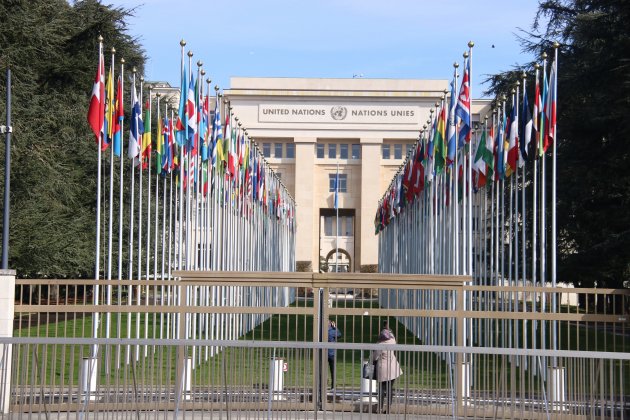
ACN
The case is now at the UN
Now, the international legal path isn't easy. Taking the Catalan affair to both the UN and the European Court of Human Rights is a long road full of obstacles. Moreover, many doubts arise: are their decisions binding? Does Spain have leeway to respect it in some way more favourable to its interests? What chances do their applications really have of being successful?
There are currently two cases open on the Catalan question at the United Nations. The first, as already mentioned, is the applications from Sànchez and Puigdemont to the Human Rights Committee denouncing violations of the Universal Declaration of Human Rights and the International Covenant on Civil and Political Rights. Article 25 of this Covenant defines the rights to unrestricted political participation, including active and passive suffrage, "guaranteeing the free expression of the will of the electors". In other words, the right to vote and be elected as a representative, a right which would not be being guaranteed if Llarena doesn't allow Jordi Sànchez to stand for investiture as president of Catalonia.
The Human Rights Committee is formed of 18 independent experts chosen by the member states. Its verdicts are binding, although they aren't automatically enacted (the petitioner has to make the justice system of the country in question aware of the resolution for it to have effect), and the recipient is given freedom to decide what measures it has to take to comply with the ruling. In other words, the Committee gives a verdict that has to be obeyed, but the judges decide how to obey it, as lawyer Nico Krisch explains.
According to lawyer Nico Krisch, for the Human Rights Committee to have issued interim measures in Sànchez's case is very revealing, an "exceptional" measure
Moreover, article 10 of the Spanish Constitution says: "The principles relating to the fundamental rights and liberties recognised by the Constitution shall be interpreted in conformity with the Universal Declaration of Human Rights and the international treaties and agreements thereon ratified by Spain". Between this and being a signatory of the First Optional Protocol of the International Covenant on Civil and Political Rights (which provides for individual complaints to the Committee), Spain will have to accept the verdict.
Moreover, as Nico Krisch has explained, for the Committee to have issued interim measures in Sànchez's case is very revealing, an "exceptional" measure. In fact, as with the European Court of Human Rights, they are normally only granted in cases where there are "violations of the rights to life or physical integrity", often involving extradition cases. This, according to the lawyer, reflects "the committee's worries about the situation of human and political rights in relation to the Catalan conflict" and makes him optimistic towards the eventual resolution, expected in six months' time.
In his statement to the Human Rights Council, the UN High Commissioner for Human Rights has already condemned the "excessive use of force by police" seen during last year's referendum.
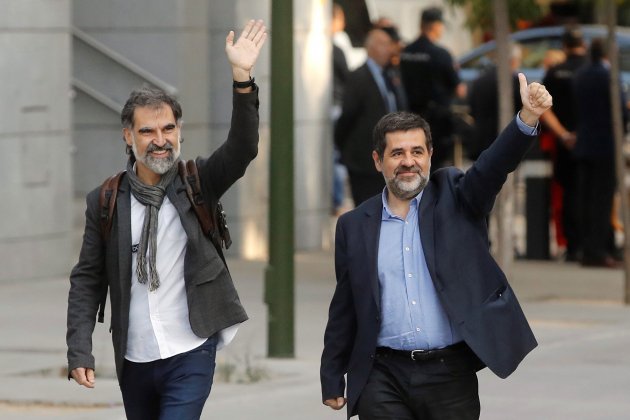
EFE
Arbitrary detentions?
The second case with the UN, about the detention of Oriol Junqueras, Jordi Sànchez and Jordi Cuixart, was presented in February to the Working Group on Arbitrary Detention. The group is formed of various experts who investigate detention which could contravene principles established in international treaties.
According to the Junqueras and the Jordis' international counsel, British lawyer Ben Emmerson, the working group will evaluate whether their pretrial detention violates the Universal Declaration of Human Rights, as mentioned in the Spanish Constitution as quoted above. In the case of the Catalan political prisoners, their rights to political participation, freedom of association and freedom of expression could have been violated.
Emmerson believes it is a "classic case of arbitrary political detention" which severely harms political plurality because it wants to make them "abdicate their political beliefs". As such he expressed optimism that the working group's verdict would be favourable.
The Working Group on Arbitrary Detention will evaluate whether their pretrial detention violates the Universal Declaration of Human Rights
Whatever they end up deciding, however, will not be binding. That said, their verdict will be very important because, according to the foreign defence team, it could be used as a tool for political pressure. This week, Nico Krisch, the lawyer leading the first complaint, indicated that this verdict on possible arbitrary detention is expected "soon".
The new imprisonments of four ministers and former Parliament speaker Carme Forcadell, with the possible inherent violation of Jordi Turull's political rights when he couldn't attend the second round vote on his investiture, could follow a very similar path. The responses to the cases already open will determine their options too.
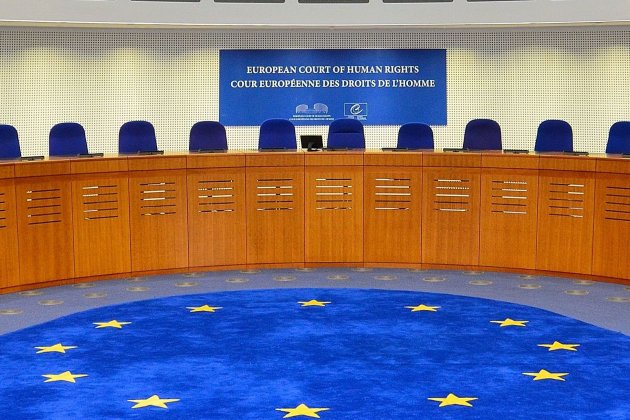
Adrian Grycuk (Wikimedia)
Last stop: Strasbourg
The first attempt to go to Strasbourg didn't go well. Whilst Puigdemont and Sànchez were candidates for investiture as president, their defences explored applying to the European Court of Human Rights for interim measures to protect their rights. In the end, aware of the great risks losing would entail, they didn't do so. As former vice-president of the European Court of Human Rights Josep Casadevall explained to El Nacional, the mechanism is limited to when "there exists a risk for a person's integrity, the majority being cases of expulsions or extraditions". In fact, vice-president Oriol Junqueras had already turned to them when the Spanish Supreme Court refused him permission to attend the opening of the new Catalan legislature, in which he had been re-elected a deputy. Strasbourg rejected his request for cautionary measures. It accepts just 7.5% of applications.
Strasbourg is the last stop where the Catalan case will end up being judged sooner or later. But the path there is everything but easy. "You can only appeal to the European Court of Human Rights once all options offered by the internal legal system of the member state have been exhausted," Casadevall said. In Spain, that means up to and including an amparo appeal to the Constitutional Court. There are very few exceptions which don't require exhausting all internal options. According to Casadevall, the court has only very rarely allowed such exceptions "when it's resulted clear and proven that it was a question of an appeal which wasn't effective". He doesn't believe that would be the case with Spain. Moreover, another factor must be taken into account: the majority of cases not accepted are due to problems of form.
The first possibility of this path could come for Oriol Junqueras, Jordi Sànchez and Jordi Cuixart. After the Supreme Court's refusals to release them, they've presented just such amparo appeals to the Constitutional Court. "It's a question of the right to freedom and safety protected by article 5 of the Convention. You can indeed appeal to the European court if there exist reasons to allege that it's a question of an illegal privation of liberty, or one not fitting the law," said Casadevall.
In the last three years, the Spanish state has been condemned on 20 occasions by the Strasbourg court for having violated the European Convention on Human Rights
Otherwise, they would have to wait for an eventual sentence finding them guilty, to be able to appeal a violation of the right to a fair trial. Among other factors, article 6 of the European Convention on Human Rights establishes that "everyone is entitled to a fair and public hearing within a reasonable time by an independent and impartial tribunal". The former vice-president of the European Court says that "if there's a just trial, that will have to be seen and debated a posteriori, first before the [Spanish] Constitutional Court and then, eventually, before the court in Strasbourg".
Whilst the judges on the European Court are proposed by the member states' governments, Casadevall notes that every judge is "elected by a majority vote of the parliamentary assembly of the Council of Europe, without any interference from the state they are from". The case of Catalonia wouldn't be the first setback faced by Spain in Strasbourg. The most recent example was over freedom of expression and burning photographs of the king, but there have been many others: for torture (and not investigating it), for immediate deportations and for violating the rights of former speaker of the Basque Parliament, Juan María Atutxa.
In the last three years, the Spanish state has been condemned on 20 occasions by the Strasbourg court for having violated the European Convention on Human Rights. The court still has 167 applications pending against Spain.

